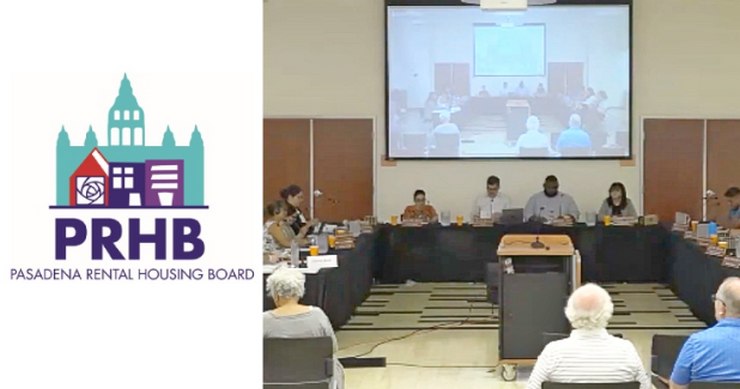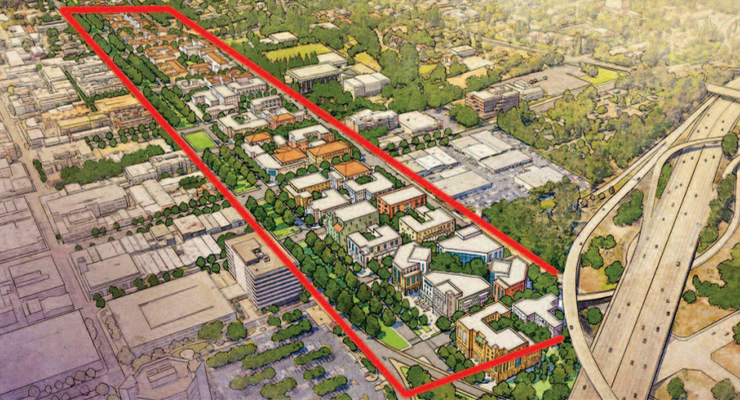The views in guest opinion pieces do not necessarily reflect the views of Pasadena Now.
 Pasadena City Manager Steve Mermell and Police Chief Phillip Sanchez stuck their thumbs in the eyes of Pasadena’s African-American political leadership on November 7. Black City Council Members John Kennedy and Tyron Hampton asked the Pasadena City administration to delay promulgating the police department bodycamera policy until it could be publicly considered by the City Council’s Public Safety Committee. Mermell/Sanchez ignored their requests. Instead, Mermell/Sanchez chose a raw power play: they implemented the previously-undisclosed final bodycamera policy on the same day that bodycameras were deployed to officers. There was no transparency, no prior public notice, and no City Council consent. We’ve been outraged by the Mermell/Sanchez undemocratic power grab and their tone-deafness to a Black community still reeling from the death of Reginald Thomas while he was in the PD’s custody.
Pasadena City Manager Steve Mermell and Police Chief Phillip Sanchez stuck their thumbs in the eyes of Pasadena’s African-American political leadership on November 7. Black City Council Members John Kennedy and Tyron Hampton asked the Pasadena City administration to delay promulgating the police department bodycamera policy until it could be publicly considered by the City Council’s Public Safety Committee. Mermell/Sanchez ignored their requests. Instead, Mermell/Sanchez chose a raw power play: they implemented the previously-undisclosed final bodycamera policy on the same day that bodycameras were deployed to officers. There was no transparency, no prior public notice, and no City Council consent. We’ve been outraged by the Mermell/Sanchez undemocratic power grab and their tone-deafness to a Black community still reeling from the death of Reginald Thomas while he was in the PD’s custody.
Our outrage might be misinterpreted as opposition to administrative rule-making. But administrative rule-making is a well-established and necessary part of governing, especially for medium-sized cities like Pasadena. The problem is not administrative rule-making per se. Rather, the problem is a City Manager/Police Chief running amok with untransparent administrative rule-making that gives special interests such as the police union undue influence, ignores public input, and circumvents the City Council’s power to instruct the administration on policy. The bad smell of the Mermell/Sanchez undemocratic bodycamera ploy appears to be backfiring, as their power play is mobilizing community push-back.
Modern government depends on administrative rule-making
with transparency and public-input safeguards
Administrative rule-making is policy determination by a government’s executive branch. Sometimes administrative rule-making requires legislative branch approval, but sometimes it does not.
Administrative-rule making is omnipresent in modern government. At the federal level, a host of cabinet and quasi-independent agencies – e.g., the Securities & Exchange Commission, the National Labor Relations Board, the National Park Service, the US Department of Education – regularly issue administrative rules and regulations that do not go through Congress and are compiled in the Code of Federal Regulations. The same is true at the State level – e.g., the California Labor Commission, the California Department of Education, the California Coastal Commission and a host of other executive-branch agencies – also regularly issue regulations that you can go online and find in the California Code of Regulations.
Both federal and state administrative rule-making is tightly governed to insure transparency and public input. Federal administrative rule-making is governed by the United States Administrative Procedures Act, 5 U.S.C. §§ 551-559. It encompasses the Freedom of Information Act (FOIA) and the Privacy Act, but most importantly for this analysis, it requires notice of proposed rulemaking which is published in the Federal Register and typically gives 60 days for public comment and an additional 30 days for reply comments. State executive agencies are governed by the California Administrative Procedures Act. The State APA includes Government Code §§11346-11348 which require detailed procedures to accommodate public participation and comment, including notification and publication procedures and a 45-day period for public input before administrative regulations can become final. Thus, federal and state administrative rule-making would not permit what Mermell/Sanchez did – i.e., they would not be permitted to secretly negotiate administrative rules with the police union and then put them into effect without allowing any public comment on the final rules nor enact the policy without open public hearings which adopt the policy.
The City administration’s secretive alliance with the police union
that has thwarted open public decision-making on police video
The City Manager’s bypassing open, democratic decision-making on police video policy is not new; rather, the Pasadena PD has a long practice of secretive joint police union/police administration decisionmaking that has shut out public participation – especially on the policy for police viewing critical incidents video.
In August, 2009, the Office of Independent (“OIR”) Group Report on the Pasadena Police Department’s killing of the African-American male LeRoy Barnes recommended the best practice that police officers, like all witnesses, should not be permitted to view video of an incident before giving their statements in incidents’ criminal investigation. (Video at that time was from dashboard video; the issue now includes bodycamera video.) 5 months later the Pasadena PD signed a January 26, 2010, secret agreement with the police union that purported to require the opposite of the OIR Group recommendation – i.e., officers were allowed under the agreement to tailor their testimony to the evidence by giving them incident videos before they made their criminal investigation statements. This secret 2010 agreement was a model of secretiveness – it was not disclosed at the time to the public, it was not approved by the City Council, and there is no evidence that the Pasadena City Attorney signed off on the agreement as she was required to do by Pasadena City Charter §1001.
In 2012, the Pasadena PD shot and killed another African-American youth, the unarmed Kendrec McDade. The recommendations of the OIR Group Report on the 2012 police killing reiterated the 2009 recommendation that Pasadena adopt the best practice that officers see video only after they give their criminal investigation statements. Chief Sanchez’s December 7, 2015, response rejected the OIR Group recommendation, citing the 2010 agreement with the police union.
But because of the public outrage flowing from release of the OIR Group report in late 2015, by February, 2016, Mermell/Sanchez reversed course. They developed a draft bodycamera policy that contained the OIR Group’s twice-recommended best practice of preventing officers from tailoring their testimony to the evidence by allowing them to view video only after giving criminal investigation statements. We arranged a meeting between Mermell/Sanchez with about two-dozen community leaders to give feedback on the draft policy; Mermell/Sanchez in that meeting proudly affirmed that they were adopting the best practice on police video viewing. But then the City administration began 8 months of secret collective bargaining negotiations with the police union during which the best practice disappeared because the Mermell/Sanchez caved-in to the police union demands. Mermell/Sanchez then held back the new policy, issuing it on November 7 contemporaneously with bodycamera deployment on the same day. Mermell/Sanchez refused the request of Council Member Kennedy, the chair of the Council’s Public Safety Committee, to have the PSC hold public hearings before implementing the previously undisclosed final policy.
The imperial City Manager/Police Chief
find a new rationale to avoid democratic input and review
Because the prior rationale of “operational decisions” wouldn’t work to justify their imperial decision to prevent democratic input and review of the bodycamera policy, we believe that Mermell/Sanchez contrived to use the rationale that the Police Chief could use administrative rulemaking to prevent transparency and Council instruction on policy.
In 2015, then-City Manager Michael Beck and Police Chief Sanchez decided, without any input from or permission by the PSC or City Council, that the PD was no longer going to conduct criminal investigations into deaths which occur during police-involved incidents. They announced that the PD was farming out that job to the LA County Sheriff. The City Manager and Police Chief just announced the policy as a fait accompli. They allowed no public vetting before their decision’s announcement. They then responded to criticism of their lack of transparency, lack of public input, and undemocratic process by saying it was an “operational” decision that was the Police Chief’s prerogative, not a “policy” decision. As Pasadena Now reported yesterday, this “operational” decision has led to an information blackout on the Reginald Thomas death because the Sheriff’s investigators are stonewalling the press and public.
When it was deju vu time this year with the November 7 bodycamera policy, the operational/not-policy explanation obviously would not work. Calling the bodycamera policy an unpolicy would only work in an Orwellian world; Pasadena’s public discourse has not yet degenerated to the level that “war” is “peace” and “Black” is “White.” So Mermell/Sanchez invented the new, equally undemocratic rationale that the Police Chief is authorized to decide police policy and could secretly negotiate and adopt its final bodycamera with no public input and no prior involvement of the City Council or its Public Safety Committee. In effect, he was asserting the prerogatives of an imperial City Manager.
Mermell’s/Sanchez’ assertion of an imperial prerogative
is legally unjustified
Mermell’s/Sanchez’ imperial assertion that they can decide public policy by circumventing City Council policy instruction is inconsistent with the City Council’s power under the Pasadena City Charter to instruct the City Manager on policy. Their action in denying Council Member Kennedy’s request was illegal.
Mermell/Sanchez rest their imperial prerogative to determine police policy on Pasadena Municipal Code §2.295.030; it provides:
The police chief shall have all of the powers that are now or hereafter conferred upon sheriffs by the laws of the state and shall be entitled to the same protection. The police chief shall have authority, subject to the city manager’s approval to adopt rules and regulations for the administration and discipline of officers and employees of the department.
§2.295.030 facially seems to support the Mermell/Sanchez assertion of imperial rule-making authority. So what’s the legal problem?
The problem is that Mermell/Sanchez isolate the mere ordinance §2.295.030 from its superior authority, the Pasadena City Charter. The Pasadena City Charter gives the City Council the power to instruct on policy; because the power to instruct on policy is given by the Charter, it trumps the inferior municipal code provision. Charter §604(J) provides in pertinent part:
It shall be competent for the City Council to instruct the City Manager in all matters of policy, and any action, determination or omission of the City Manager shall be subject to review by the City Council, but no such action, determination or omission shall be overruled or modified by a vote of less than five members thereon… (Emphasis added)
Charter §604(J) gives the City Council two powers: (1) The power to instruct the City Manager on a matter of policy, which presumptively occurs before there is any final action by the City Manager; and (2) The policy to review and reverse any action, including an action on policy, which necessarily occurs after the City Manager acts.
The Council’s Public Safety Committee Chair, John Kennedy, sought to exercise the Council’s instruction power by requesting Mermell to submit the proposed policy to the PSC for instruction. Mermell prevented the Council from exercising its instruction power by his rush-issuance of a purportedly final policy.
Mermell’s subverting the Council’s right to instruct was probably illegal. Generally, grants of power such as those in Charter §604(J) include implied protections against bad faith subversion of the powers. We therefore think there is probable cause to believe that a judge would determine that Mermell’s action was illegal.
Even if legal, the Mermell/Sanchez conduct should not be tolerated;
the Council need to make clear that its right to determine policy
cannot be subverted
At best, Mermell’s/Sanchez’s deliberately subverting the Council’s power to instruct on policy is legally suspect; even if a court were to determine it is legally justified under the Charter, it should not be tolerated for policy reasons.
We give our police the ultimate powers to take the life and liberty of citizens. We devote tens of millions of taxpayer dollars to training them, equipping them, paying them, and supervising them. The public’s interest in policing best practices is a core value that requires transparency and rules that are decided by elected representatives who are accountable to the citizenry.
We should also step back from the immediate bodycamera issues to see what’s wrong with Pasadena’s administrative rule-making process so we fix what’s bad with Pasadena’s broken system of deciding police policy but preserve what’s good. Pasadena must move to a police department that embraces good practices through policies that are transparently adopted. If Pasadena had policies governing administrative rule-making like those in the federal and state APAs, the Mermell/Sanchez power-play that thumbed their noses at the City Council and the Black community could not have occurred. But the intricate procedures involved in a well-constructed municipal administrative procedure policy may be more regulation than is warranted for a City the size of Pasadena. There is a viable alternative – i.e., recognizing that the City Council’s power to instruct requires that any significant policy decision must go through the Council Committee responsible for the matter and ultimately through the City Council, with their Brown Act requirements for public notice and the right of public comment before policy becomes final.
Deciding public policy in a black box that is impervious to public scrutiny and then issuing the policy without public input and democratic review is unacceptable. The first step is to rebuke the Mermell/Sanchez imperial policy promulgation; the Council needs to then move on to the process of reforming Pasadena’s administrative rule-making to insure transparency, public participation and democratic control of important policies. We should not throw out the administrative rule-making baby because of the foul bathwater in which Mermell/Sanchez bathed their tone-deaf effort to ram through a faulty body-camera policy, but we need to fix a broken system.
Skip Hickambottom and Dale Gronemeier are local civil rights attorneys active in the Coalition for Increased Civilian Oversight of Pasadena Police.














 0 comments
0 comments


